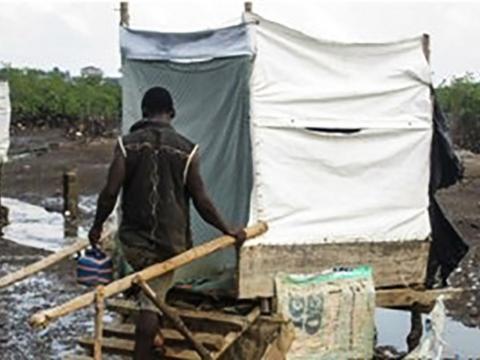By Politico Staff Writer
Some 34 communities have been declared open defaecation free in Sierra Leone.
The declaration was made as part of this year’s commemoration of World Toilet Day (WTD), which was observed on Thursday 19th November.
The communities are spread across four districts: Bonthe, Falaba, Port Loko and Koinadugu.
A community is declared open defaecation free when every household has a toilet for use, as opposed to defaecating in the bush. Families are guided on erecting durable structures which ensure the privacy of users and help with the safe disposal of human waste. Affordable and locally available resources are used to put up the super structure of the toilet.
The event marking WTD was held in the southern Bo District, where officials said the move is part of the “renewed vigour” to scale up Community-Led Total Sanitation (CLTS) through the Chiefdom-wide approach.
The CLTS approach is an innovative approach aimed at mobilising the entire communities within a chiefdom to eliminate open defaecation and improve hygiene practices such as regular handwashing with soap and water, safe food handling, and safe disposal of domestic waste.
Five chiefdoms have been targeted to achieve Chiefdom-wide Open Defaecation Free (ODF) status in 2020.
“Every household is expected to have a safe means of disposal of human excreta as well as adequate water supply for hand washing and other domestic use. Communities are encouraged to embrace the new innovate strategy of Community Led-Total Sanitation to achieve the sustainable development goal six by 2030. Open defaecation cannot be an option in the fight against climate change,” Alhaji Dr Momodu Sesay, Director of Environmental Health and Sanitation in the Ministry of Health and Sanitation (MoHS), said at the event.
According to the 2017 joint WHO/UNICEF Joint Monitoring Programme (JMP), many families across Sierra Leone continue to suffer from poor access to sanitation and hygiene. Toilets are still out of the reach of more than 18 percent of the population, who revert to open defaecation, while 33 percent of the population use unimproved sanitation facilities, placing their lives at risk of devasting health and development consequences.
Sierra Leone is off-track to deliver universal access to safe sanitation by 2030.
The JMP 2017 also indicate that four in five persons (84 percent) in Sierra Leone use sanitation options that leave human waste exposed and untreated, threatening human and environmental health. It also shows that in two schools out of every five schools in the country, children do not have access to toilets, while 11 percent of the health care facilities do not have toilets.
There is also high level of disparity across regions and wealth quintiles, with those living in poor and rural communities at risk of being left behind. The poorest households in Sierra Leone are nine times more likely to defaecate in the open than those in the upper wealth quantile.
The practice of open defaecation is as high as 34 percent in the country’s Southern region, compared with just five (5) percent in the Western region.
Studies show that there is a correlation between poor sanitation coverage and childhood illnesses such as diarrhoeal diseases, pneumonia and malnutrition, which sometimes lead to death or lifelong development challenges.
Working in partnership with UNICEF and Civil Society Partners, the Government has prioritised a Chiefdom-wide approach to CLTS as a cost-effective and mass approach that can lead the nation to full sanitation coverage by 2030.
“UNICEF applauds the Government of Sierra Leone for working closely with communities across the country to ensure that they build toilets for all family members to use and handwashing facilities to practice good hygiene at their homesteads,” said UNICEF Chief of Water, Sanitation and Hygiene, Bishnu Timilsina. “Eliminating the practice of open defaecation helps to not only improve the health of children and their families but is a means to ensure that the safety and dignity of all people is maintained.”
The 2020 World Toilet Day celebration theme is “Sustainable Sanitation and Climate Change,” and is a stark reminder of the effects of Climate Change – the threats and opportunities it presents – on the sustenance of sanitation infrastructure. Floods can damage toilets and spread human waste into homes, communities, and food crops - causing deadly diseases.
Achieving universal access to sanitation in Sierra Leone by 2030, in line with the Sustainable Development Goals (SDGs), will require acceleration in current progress rates with a concerted effort to reach those at risk of being left behind.
In recognition of this, the Government of Sierra Leone, on 15th October 2020, launched the National Strategy on Sanitation and Hygiene Promotion. This strategy highlighted the Chiefdom-wide approach to community-led total sanitation as one of the means to accelerate progress towards ending open defecation in the country by 2025 and leaving no one behind in the push to achieve universal access to basic sanitation in Sierra Leone by 2030. With only ten years left until 2030, the rate at which coverage increases will need to increase.
A new Strategy on Water Safety Plans was also launched at the same event in Bo last week. The Water Safety Plan Strategy is geared to support the Government’s focus on improving and sustaining the quality of drinking water from catchment to consumption. This effort will increase access to safely managed water supply services and eliminate the geographic and economic inequalities and gaps in the country’s water sector. This strategy, which was developed through technical and financial support from UNICEF, articulates Sierra Leone’s roadmap and investment requirements to accelerate progress towards meeting the Sustainable development Goals (SDG) targets in the water, sanitation, and hygiene sector in Sierra Leone.
Source: Unicef
Copyright © 2020 Politico Online








